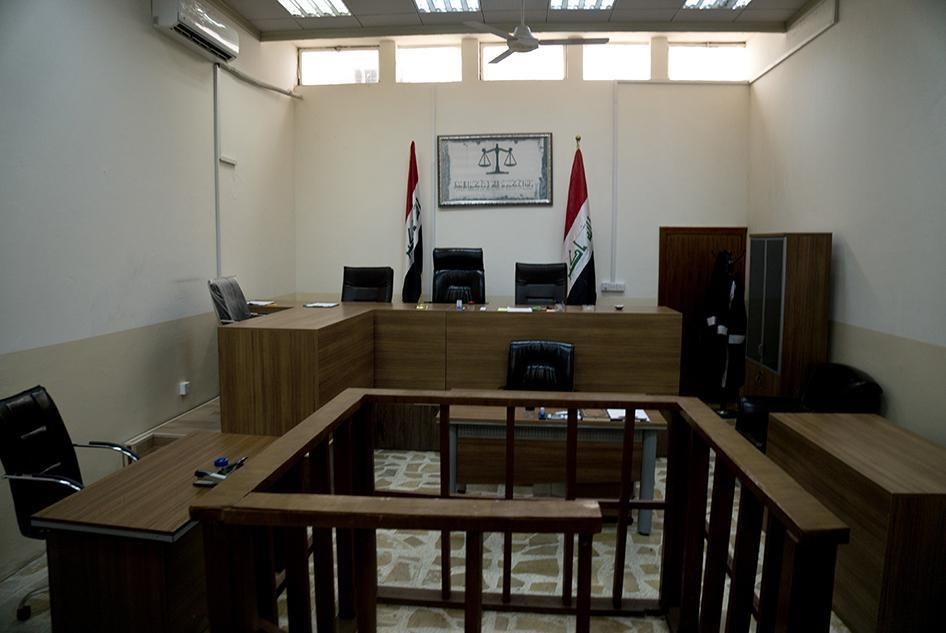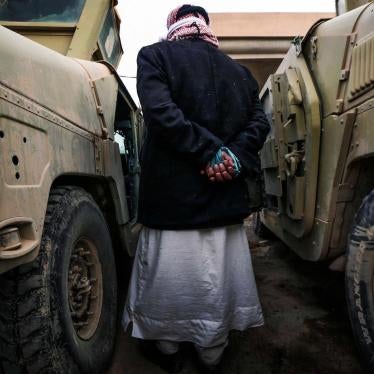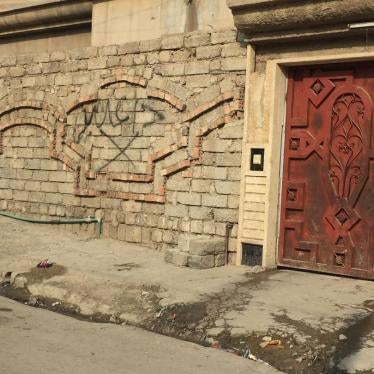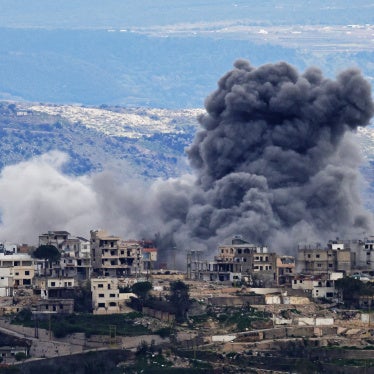(Beirut) – Prosecutions of Islamic State (ISIS) suspects in Iraq are proceeding based on a deeply flawed and vague counterterrorism law, but the Nineveh governorate’s counterterrorism court has made improvements in recent months, Human Rights Watch said today.
Following a December 2017 Human Rights Watch report, judges in the Nineveh governorate in northern Iraq are requiring a higher evidentiary standard to detain and prosecute suspects, minimizing the court’s reliance on confessions alone, erroneous wanted lists, and unsubstantiated allegations.
“What we see in Nineveh is a significant shift in the way that prosecutions are proceeding,” said Lama Fakih, deputy Middle East and North Africa director at Human Rights Watch. “Throwing out cases with flimsy or no evidence is a step forward, but more work is needed to ensure defendants are not mistreated and get fair trials.”
On February 4, 2019, Human Rights Watch visited Nineveh’s counterterrorism court in Tal Kayf, north of Mosul. The head of the investigation court, Raed al-Maslah, said the court is processing the highest number of ISIS suspects in the country, with 9,000 cases in 2018. Of those, 2,036 cases were dropped; 3,162 remain under investigation; 2,827 were referred to trial, including 561 children; and 975 were transferred to other courts because the cases were not linked to terror charges. He did not have statistics on the outcomes.
Al-Maslah said that his court was taking action to improve overall respect of the rule of law. He said that in response to a Human Rights Watch report uncovering a prison the National Security Service (NSS) was illegally running in Mosul, he asked the NSS to transfer the several hundred prisoners to the Interior Ministry. However, he acknowledged they still held about 70 detainees.
In perhaps the biggest improvement in the court’s prosecutions, he said that since mid-2018, his court has been requiring a higher evidentiary standard to detain and prosecute suspects. He said that investigators have found a trove of ISIS documents that have facilitated the process, along with social media, phone, and text message data; fingerprints; and other forensic material.
In light of this new evidence, al-Maslah said he struck 7,000 names off wanted lists because they consisted of a first and last name but no other information. He said judges will only issue an arrest warrant based on evidence in ISIS documents, or on detailed and credible allegations from witnesses, including the suspect’s father and grandfather’s name. He said his court has issued 50,000 arrest warrants for people wanted for ISIS affiliation under this new standard.
Under the new procedures, anyone arrested typically appears before an investigative judge within 48 hours. If they maintain innocence, intelligence officers consult the accused’s local community leader and two neighbors to assess the credibility of the allegations. If the person is cleared, including based on witness testimony, the court issues a notice to remove the defendant’s name from wanted lists countrywide, reducing the possibility of rearrests.
Human Rights Watch sat in on a trial before the Nineveh counterterrorism court on February 4 and observed judges applying the new rules. Two lawyers that regularly appear at the court confirmed that the court’s operations had improved. “The court is more process-driven than before and as a result you are seeing fewer confession-based prosecutions, and fewer allegations of torture,” one said. “Also, with time the court has become much more sensitive to individuals using ISIS allegations as a form of personal revenge.”
There is some indication that these heightened evidentiary standards are being applied elsewhere. In a February 7 statement, the US-led coalition highlighted an increase in local police forces in Baghdad and Diyala using warrants and collecting evidence “to support investigations with the aim to prosecute offenders in a proper manner.” An international trial observer told Human Rights Watch that they had seen heightened evidentiary standards used in Karkh, one of two criminal courts in Baghdad.
However, Human Rights Watch researchers observed that in October 2018, in Baghdad’s second criminal court, Risafa, judges continue to process cases solely based on a defendant’s confession, with the defendant frequently alleging torture to extract the statement. This suggests that the heightened requirements are not being used consistently in proceedings across Iraq. Authorities should consider transferring cases from Baghdad to the Nineveh counterterrorism court if the suspect is believed to have committed their crime in Nineveh.
In addition, concerns about torture and reliance on coerced confessions remain with the lawyers saying that from their observations, the prevalence of torture, as well as deaths in custody, have continued.
In a trial of a man accused of ISIS membership that Human Rights Watch observed in early 2019, the defendant denied some charges he had confessed to and said that an officer had threatened to take him “back to Safina” to beat him again if he changed any part of his confession in court. Safina is a village south of Mosul where Human Rights Watch had documented torture allegations in abandoned houses in 2017 and has heard continued allegations of abuse. The judge ordered a medical examination after repeated requests from the defendant but did not ask for details or to show any marks on his body consistent with torture. Human Rights Watch has observed that judges routinely ignore torture allegations by defendants, and almost never investigate accused officers.
Iraq’s deeply flawed, vague counterterrorism law (no. 13/2005) remains a major concern, Human Rights Watch said. The law covers a wide variety of crimes including membership or support for a terrorist organization. While judicial authorities can issue lower sentences, the law stipulates the death penalty for anyone who committed, incited, planned, financed, or assisted in a terrorist act.
In one case before the Nineveh counterterrorism court in early January, a male nurse was prosecuted under the law because he provided ISIS members with medical care after ISIS took over the area. International humanitarian law prohibits prosecuting medical workers for performing medical duties compatible with medical ethics.
Because authorities are still not bringing any additional charges beyond the counterterrorism law against ISIS suspects, including from the penal code, authorities are not making efforts to solicit victim participation in the trials, including as witnesses.
Iraqi authorities should develop a coordinated strategy to prioritize the prosecution of those who committed the most serious crimes by bringing charges for the full range of crimes committed, and with a clear role for victims, Human Rights Watch said. Authorities should drop charges against those whose functions under ISIS helped protect human rights.
On February 24, Human Rights Watch also wrote to Muhammad Tahir al-Mulhim, director of the human rights office within the Prime Minister’s Advisory Council, Foreign Minister Mohamed Alhakim, and Interior Ministry Inspector General Jamal al-Asadi, asking whether the government had investigated Human Rights Watch allegations of ill-treatment of prisoners in an August 2018 report. Human Rights Watch also wrote to Chief Justice Faik Zaidan, asking what steps judges are obliged to take once a defendant alleges torture. None of those contacted has responded.
Iraq’s High Judicial Council should issue guidelines on the steps judges are obliged when a defendant alleges torture. Judges should investigate all credible allegations of torture and the security forces responsible, and order transfers of detainees to different facilities immediately after they allege torture or ill-treatment, to protect them from retaliation. Parliament should pass the draft Anti-Torture Law, which would require judges to order a medical examination of any detainee alleging torture within 24 hours of learning of the allegation.
Iraq’s foreign minister should urge parliament to ratify the Optional Protocol to the Convention Against Torture. Pending this ratification, the government should commit to setting up a National Preventative Mechanism that can inspect all detention centers in Iraq and set up effective complaint mechanisms for authorities and facilities involved in detention and interrogations. The heads of the federal intelligence agency, NSS, and the new minister of interior, once appointed, should issue statements to their chain of command on the prohibition of the use of torture and their commitment to punish perpetrators. The prime minister should publicly condemn the use of torture by all law enforcement, security and military personnel.
“The recent developments in Nineveh show that judicial authorities can better ensure that terrorism trials respect defendants’ rights.” Fakih said. “We hope to see courts elsewhere in Iraq learning from the improvements in Nineveh and introducing similar measures that can serve justice while protecting defendants from abuse.”








